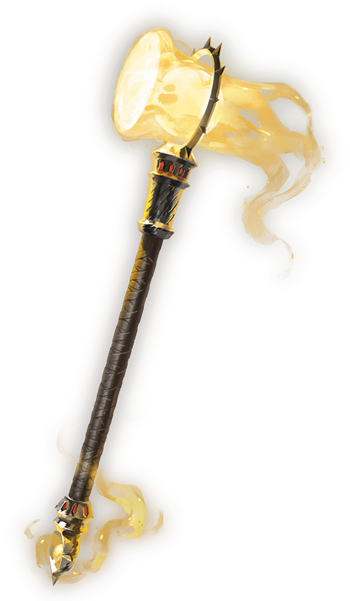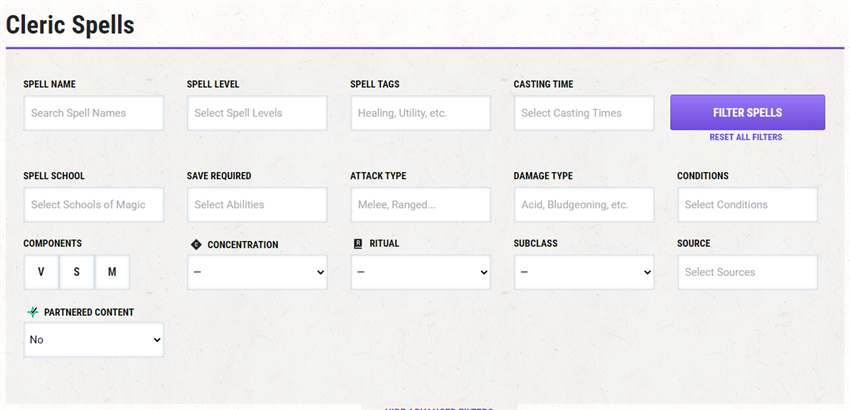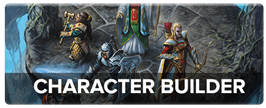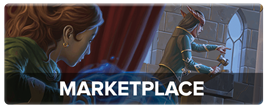 Spell Spotlight examines D&D’s best, worst, and most interesting spells, giving you the tools you need to play a spellcaster who knows exactly what they’re doing. Today, we’re looking at two iconic cleric spells: healing word and spiritual weapon. These spells define the low-level cleric experience, giving characters who master them highly flexible and mobile healing and combat abilities.
Spell Spotlight examines D&D’s best, worst, and most interesting spells, giving you the tools you need to play a spellcaster who knows exactly what they’re doing. Today, we’re looking at two iconic cleric spells: healing word and spiritual weapon. These spells define the low-level cleric experience, giving characters who master them highly flexible and mobile healing and combat abilities.
What is Healing Word?
Healing word is a 1st-level spell available to bards, clerics, druids, and Alchemist artificers. It allows you to heal a creature you can see within 60 feet a number of hit points equal to 1d4 + your spellcasting modifier. For most 1st-level casters, this is an average healing of 4 or 5 hit points. It isn’t quite as strong as cure wounds (which averages 6 or 7 hit points at the same level of play), but its ability to be cast from range and its bonus action casting time make it every bit as powerful as its more classic counterpart.
Though at low levels, the difference between 1d4 of healing and 1d8 of healing may be the difference between healing to half health and healing to full health, this minor distinction practically disappears by the time you and your party reaches 3rd level. This is especially true if you’re a Life domain cleric; your Disciple of Life and Blessed Healer features make healing spells so useful that it hardly matters how much healing the spell itself provides. The mere fact that it heals anything is enough. For example, when casting healing word at 1st level, your Disciple of Life feature adds an extra 3 points of healing—that static bonus nearly doubles the amount of healing the spell provides normally!
A range of 60 feet gives you the ability to heal an injured friend from far away, as long as you have line of sight. Most encounter areas in published D&D adventures aren’t larger than 60 feet in any direction, especially at low levels, so you can effectively heal a friend from anywhere on the battlefield. Even more attractive than its range, however, is its rapid casting time. Since healing word has a casting time of 1 bonus action, as opposed to 1 action, it is incredibly useful for casters who have something else to do as their action. See “Strategies, Synergies, and Struggles” below for a closer look at the power of the bonus action.
What is Spiritual Weapon?
 Spiritual weapon is a 2nd-level spell available to clerics (and Oath of Conquest paladins) that allows them to conjure a weapon that can fly through the air and strike down their foes. This spell deals only a small amount of damage when it’s first cast, dealing only 1d8 + spellcasting modifier damage if it hits. The spell scorching ray is a good spell to compare it to, even though scorching ray is only available to wizards and sorcerers, while spiritual weapon is largely only available to clerics.
Spiritual weapon is a 2nd-level spell available to clerics (and Oath of Conquest paladins) that allows them to conjure a weapon that can fly through the air and strike down their foes. This spell deals only a small amount of damage when it’s first cast, dealing only 1d8 + spellcasting modifier damage if it hits. The spell scorching ray is a good spell to compare it to, even though scorching ray is only available to wizards and sorcerers, while spiritual weapon is largely only available to clerics.
Scorching ray deals damage in large spikes, dealing up to 6d6 fire damage on the turn it’s cast to up to three targets within 120 feet of the caster. On the other hand, spiritual weapon deals a smaller amount of damage spread out over up to a full minute of combat, and doesn’t require concentration. It can be conjured at any point within 60 feet of the caster, making its range less potent than scorching ray, but as noted above, 60 feet is usually more than enough room in small, low-level arenas. If that range isn’t enough, the weapon can move up to 20 feet on each of your turns. The spell’s duration and maneuverability allows it to deal up to a maximum of 10d8 + ten times the caster’s spellcasting modifier over the course of an exceptionally long battle.
A combat encounter that lasts a whole minute of in-game time (that’s ten full rounds of combat!) is an outlandish rarity, however. Few battles last more than 3 rounds, so assuming that the spell deals a total of 3d8 + three times the caster’s spellcasting modifier, its damage is comparable to other 2nd-level spells—an average of 22 damage compared to scorching ray’s average of 21 damage. Spreading the damage out over several rounds is a definite drawback, but spiritual weapon’s versatility (and its hard-to-resist force damage type) make it easy to overlook the consequences its slow-and-steady approach to dealing damage.
Where this spell really shines, however, is in its bonus action casting time and the ability to command it to attack as a bonus action on each of your turns. Most clerics only have a small handful of spells or class features that grant them a bonus action, making it easy to justify using your bonus action to attack with your spiritual weapon on every single turn in combat.
Spellcasting Strategies and Struggles
On the surface, healing word and spiritual weapon are totally different spells; one heals allies, the other hurts enemies. However, there are two main traits that unify these spells: the first is their 60-foot range. These two spells allow the caster to heal and fight well beyond the reach of their hands. With these spells, the battlefield is their oyster.
These spell’s other unifying power, their bonus action casting time, is their greatest strength—and also their greatest weakness. A bonus action casting time is powerful on a turn by turn basis. Being able to cast a healing or damage spell as a bonus action frees up your action for other things—such as making a weapon attack, casting a cantrip, hiding, searching for something, or any number of other Actions in Combat.
Clerics and bards can take the Attack action (which at low levels is often nearly as powerful as a fighter or paladin’s attack), and druids can do the same, especially if they have a quarterstaff empowered by the shillelagh cantrip. Having an action to use after spending a bonus action to heal is useful casters who know offensive cantrips like sacred flame for clerics, primal savagery for druids, or vicious mockery for bards.
Rules Tip: Casting Spells as a Bonus Action
When you cast a spell as a bonus action, you can’t cast another spell in the same turn unless that spell is a cantrip that you cast as an action. Similarly, a bonus action isn’t “inferior” to an action. A spell that has a casting time of 1 bonus action can’t be cast as an action, even though it may seem like an action is superior to a bonus action. Allowing a bonus action spell to be cast as an action is a reasonable house rule to propose to your group, but it’s not part of the official D&D rules.

Since both healing word and spiritual weapon have bonus action casting times, however, this means that they can’t be used together on the same turn. This is even true for the turns after you’ve cast spiritual weapon, since you need to use your bonus action to attack with the weapon on future turns. This bonus action overload means that clerics need to decide whether they want to lean into the role of healing, or the role of offense. You could lessen the impact of this choice by choosing to prepare the slightly less useful cure wounds spell instead of healing word.
Bards and druids have access to healing word, so they’re impacted by this bonus action bottleneck, too! Even though they don’t have spiritual weapon on their class’s spell lists, they still have other spells and class features that require a bonus action to use. A bard can’t cast healing word and give someone Bardic Inspiration. A druid can’t cast healing word and also cast shillelagh—though they can attack with a weapon affected by shillelagh once the spell has been cast.
If you’re playing a spellcaster and want to create a powerful character, try to make sure you can reliably do something with both your action and your bonus action on a turn. You don’t have to always use both (since this can slow down play and hog the spotlight) but having the option to do two cool things per turn instead of one makes you more likely to have fun and effective turns. Bonus action spells can help you do that if you don’t have many class features that can be used as a bonus action (e.g., Bardic Inspiration, Combat Wild Shape, etc.).

If you want to see what spells you can cast as a bonus action, go the Game Rules dropdown at the top of the page, find the Spells header, and click on your class’s name. This will take you to your class’s fully searchable spell list. Once there, open the Show Advanced Filters menu and type “1 Bonus Action” into the Casting Time bar. Hit Filter Spells, and that will show you all the spells on your class’s spell list that can be cast as a bonus action. Have fun discovering small combos, like casting word of radiance as an action on a group of enemies surrounding you, and then immediately casting sanctuary on yourself as a bonus action to avoid retaliation.
What are your favorite bonus action + action combos? What other spells do you want to see spotlighted in Spell Spotlight? Let us know in the comments!
Create A Brand-New Adventurer Acquire New Powers and Adventures Browse All Your D&D Content
 James Haeck is the lead writer for D&D Beyond, the co-author of Waterdeep: Dragon Heist, Baldur's Gate: Descent into Avernus, and the Critical Role Explorer's Guide to Wildemount, a member of the Guild Adepts, and a freelance writer for Wizards of the Coast, the D&D Adventurers League, and other RPG companies. He lives in Seattle, Washington with his fiancée Hannah and their animal companions Mei and Marzipan. You can find him wasting time on Twitter at @jamesjhaeck.
James Haeck is the lead writer for D&D Beyond, the co-author of Waterdeep: Dragon Heist, Baldur's Gate: Descent into Avernus, and the Critical Role Explorer's Guide to Wildemount, a member of the Guild Adepts, and a freelance writer for Wizards of the Coast, the D&D Adventurers League, and other RPG companies. He lives in Seattle, Washington with his fiancée Hannah and their animal companions Mei and Marzipan. You can find him wasting time on Twitter at @jamesjhaeck.











-
View User Profile
-
Send Message
Posted Jun 25, 2020chill dude
-
View User Profile
-
Send Message
Posted Jun 25, 2020I just started playing a Life Cleric in our game and it is all new to me. This helped a lot thank you James!
-
View User Profile
-
Send Message
Posted Jun 25, 2020If you've got Spiritual Weapon active, a good combo is using Guiding Bolt then bonus attack with Spiritual Weapon. Your Guiding Bolt gives advantage to your Spiritual Weapon! :D
-
View User Profile
-
Send Message
Posted Jun 25, 2020Great article especially for new players looking for tips , plus any and all any examples on bonus action economy are useful!
-
View User Profile
-
Send Message
Posted Jun 25, 2020Aid does not require concentration either. That is part of why it is an acceptable 2nd level spell.
-
View User Profile
-
Send Message
Posted Jun 25, 2020The Life Domain is available, true - but the extra healing from the Life Domain's Disciple of Life feature, which heals an additional 2+ the spell's level worth of HP, has never been integrated into D&DBeyond, requiring the player to always remember and tack on those extra 3-11 points of healing.
-
View User Profile
-
Send Message
Posted Jun 25, 2020I'm not as sure about Spiritual Weapon, but Healing Word is absolutely awesome.
Heck, there are players adamantly declaring that the spell is TOO strong and makes the game too easy; they actually have good arguments, and I'd lean that way long before deciding the spell was useless.
As my main party's bard, and primary healer, I've saved the team more than once from a TPK, in situations where multiple teammates were down at once, with mainly just that spell. Not because no one ever went to 0 hit points, but because once they did, I was able to bring them back up at range and STILL take another effective action.
Characters at 1 HP can fight just as effectively as players at full HP; so if you're using Healing Word to try to keep your team's HP as high as you can, you are seriously using it wrong. If you limit it to (1) reviving downed teammates and (2) keeping a teammate from going down in the next attack (possibly via an upcast,) it almost feels like cheating. Almost.
-
View User Profile
-
Send Message
Posted Jun 25, 2020Oh, I see! I haven’t built a Life Cleric on DDB yet, so I didn’t know that. I agree; DDB’s main draw is doing all of the math and writing for the players, it seems like an oversight that there are still places where you have to do it yourself!
-
View User Profile
-
Send Message
Posted Jun 25, 2020Oatmeal
-
View User Profile
-
Send Message
Posted Jun 25, 2020Anyone thinking spiritual weapon is under powered has never had a spirit guardians going then hit someone with an inflict wounds and followed it up with a wack from spiritual weapon for 3d8+3d10+1d8+mod lol. While it may take 2-3 turns to get set up once it happens you become a major threat on the battlefield. Even substituting an inflict wounds with a toll of the dead still means its 3d8+2d12+1d8+mod just at 5th-6th lvl
-
View User Profile
-
Send Message
Posted Jun 25, 2020Very succinct article that provides some interesting ideas for multiclassing!
-
View User Profile
-
Send Message
Posted Jun 25, 2020I don't agree with this idea expressed at the end of the article regarding the use of an action and bonus action in the same turn:
"You don’t have to always use both (since this can slow down play and hog the spotlight)"
Choosing to use your bonus action is not hogging the spotlight. It's an integral part of game mechanics and part of being a helpful team player. A cleric who uses healing word isn't hogging the spotlight, nor a bard who uses inspires someone, nor a fighter who heals with second wind, nor a rogue who hides with cunning action, nor a ranger who makes an offhand attack with a dagger, nor a monk who uses flurry of blows, nor a barbarian who rages.
Why would anyone shame someone else for using their character's abilities? May as well not do anything on your turn to avoid slowing down play and hogging the spotlight. In fact, by that logic, may as well not even play.
An actual, valid reason for not using both an action and bonus action on your turn is simply because you can't. If you're concerned about slowing down play, think about how you want to use your action and bonus action before it's your turn. Forethought saves more time than virtually anything else in combat.
-
View User Profile
-
Send Message
Posted Jun 25, 2020One of my favorite bonus action spell combos is to cast defensive cleric spells such as “Shield of Faith” or “Sanctuary” as a bonus action and follow up with either the Help Action or Dodge action as required. This can be quite effective at lower levels since Hitpoints are so low.
sanctuary and the help action can be perfect for ensuring an ally gains advantage on their next attack while imposing two successful roll requirements against any foes that target you.
This may even be more effective than casting cantrips at higher levels if you run out of spell slots depending on your party composition.
-
View User Profile
-
Send Message
Posted Jun 26, 2020I understand the reasoning behind that, but I often feel like that type of support gameplay of "well you're not worth healing until you're at 0" seems very metagamey.
-
View User Profile
-
Send Message
Posted Jun 26, 2020I agree, but also you can think about it like this: the cast knows that it's just a quick prayer to their deity (or whatever the source of their magic is), so while they could spend it on healing someone who is still alive, the word they offer to their god is "I'm not through with them yet, don't you dare" in order to bring them back from the brink.
-
View User Profile
-
Send Message
Posted Jun 26, 2020While the conflict between the BA (bonus action) of the Spiritual Weapon and Healing Word is apparent, it becomes less of a drawback for the Spiritual Weapon later on.
There are so many spells, which are used as an action and provide for the cleric that using the bonus action for the Spiritual Weapon is much more of a non-issue.
One question though for my fellow DMs out there... How would you rule on Spirit Shroud + Spiritual Weapon?
In my opinion, they would stack as long as someone is within 10 feet, as Spirit Shroud specifies that it is "any attack you make deals 1d8 extra damage when you hit a creature within 10 feet of you".
Counter argument would be that the Spiritual Weapon is a separate entity from the caster (which is a bit of nitpicking though in my opinion.)
Looking forward to your feedback :)
-
View User Profile
-
Send Message
Posted Jun 26, 2020I've found that a good way as a DM to encourage your players to use healing spells earlier than when a PC is at 0 hit points is to implement the optional Lingering Injuries rules from the DMG that trigger when a character drops to 0. Some of those are harmlessly removed by magical healing anyway, but the loss of a hand or eye in a fight requires regeneration or similar magic, which is a significant investment in many adventuring scenarios.
-
View User Profile
-
Send Message
Posted Jun 26, 2020Well yeah. They're cool.
-
View User Profile
-
Send Message
Posted Jun 26, 2020Unless you have a better attacker near the enemy in question this is a GREAT plan!
-
View User Profile
-
Send Message
Posted Jun 26, 2020"Rules Tip: Casting Spells as a Bonus Action
When you cast a spell as a bonus action, you can’t cast another spell in the same turn unless that spell is a cantrip that you cast as an action. Similarly, a bonus action isn’t “inferior” to an action. A spell that has a casting time of 1 bonus action can’t be cast as an action, even though it may seem like an action is superior to a bonus action. Allowing a bonus action spell to be cast as an action is a reasonable house rule to propose to your group, but it’s not part of the official D&D rules."
This changes everything.
Fire bolt:
Cantrip, 1d10 damage.
if it can be cast twice on the same turn with this rule...thats 2d10 damage at 1st level!!!